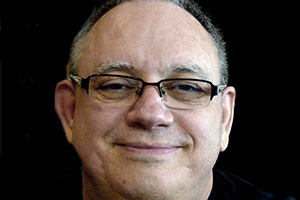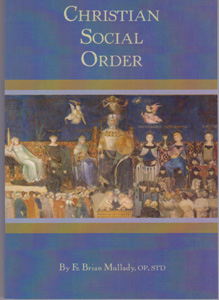
[dropcap type=”4″]T[/dropcap]heology, difficult as it can be, delves into the deeper truths of God. Church social doctrine comes out of theology and teaches us how to live as Jesus intended. With a deeper understanding of Church social doctrine and the willful act of putting away our useless pride, we can cease being Republicans or Democrats first and cease looking at the world only through a nationalistic lens.
A fellow Dominican, Fr. Brian Mullady, has written a book which clarifies social teaching, titled “Christian Social Order”.
His first point in this book, a point which half the postmodern Catholic population will immediately reject, is the notion that the Church claims authority for spiritual truths and that its teachings are fundamental to human nature. He rightly points out, however, that the Church does not seek any political power, and that politics, in the secular sense, is left to the civil realm. These truths, however, are never left out of the civil realm because believers, upon whose hearts these truths are written, exist in the civil realm.
Thus, the argument against Church authority is fundamentally meaningless because Jesus pointed at Simon, changed his name (did you ever wonder why Simon’s was the ONLY name ever changed by Christ?), called him the Rock, gave him the keys of the kingdom, gave him authority to loose and bind, and then commanded him to be the shepherd of his flock.
The social doctrine, formed over 19-plus centuries, details the foundation of human life and nature, giving us guidance to form our consciences.
Fr. Mullady states that it is natural for human beings to live in societies. The fundamental nature of society is to foster the common good. The common good, however, is rooted in natural law, i.e. the law of the nature of things, and is not subject, by reason, to mere whim. This means, according to Church teaching, that an objective truth lay at the heart of social interaction.
[quote_box_left]

Christian Social Order
Publisher: New Hope Publications
Author: Fr. Brian Mullady, OP, STD
Release Date: March 2015
Length: 198 pages
ISBN: 9781892875662
Order from: New Hope Publications
Website: www.rosary-center.org
[/quote_box_left]
Fr. Mullady traces the decline of objective truth in its various manifestations from the Enlightenment through the modernist period through to our present day. As an example, he writes, “The beginning of the 20th century also saw the full implications of the denial of personal responsibility which was heralded by Sigmund Freud in his discovery of neurosis. Freud’s theory of psychoanalysis sounded the death knell for the responsibility of the personal conscience in moral actions since it basically attributed moral behavior to a series of unconscious forces which ranged from repressed sexuality to the death wish.”
This problem literally surrounds us, in education, work, and especially in the news, and, as we can see, Fr. Mullady has named names.
One of our biggest problems today is that this denial of personal responsibility is partly responsible for radical change in the view of the human person as a unique individual to the mechanistic view that the human being is but a cog in a machine. With that, we have collectivism, or the centralizing of control over economics (i.e. over-regulation) and social action (i.e. welfare, healthcare, etc.). We can see this in all facets of our society. Because the Church teaches that the human person is created in the image of God – imago dei – and that all dignity is derived from Him, this modernist and post-modernist view is directly contrary.
Fr. Mullady also points out that the denial of personal responsibility has led us to a wrongful view of the conscience. A mechanistic view means that our consciences are formed merely by necessity, expediency, and what is useful. Absolute truth fades away and the whole society shudders. Abortion becomes the norm. Those of us who do believe, find our consciences bound to the truth which the Church teaches. Our natural freedom has allowed us the free-choice to follow the truth and avoid the free-for-all.
One really interesting find in Fr. Mullady’s book is the foundation of the idea of inalienable rights as illustrated in the Declaration of Independence. Cardinal Robert Bellarmine wrote a work called De Laicis in which he posited that power in government comes from the people and its authority is only actual if agreed upon by the people. This work was quoted in a book by a proponent of the divine right of kings as an argument. The passage from Bellarmine was underlined in the book and found in Thomas Jefferson’s personal library.
Fr. Mullady further discusses right and rights as part of the social order and then he turns Church teaching toward the actual practice in a magnificent defense of marriage.
A great and clear read.






